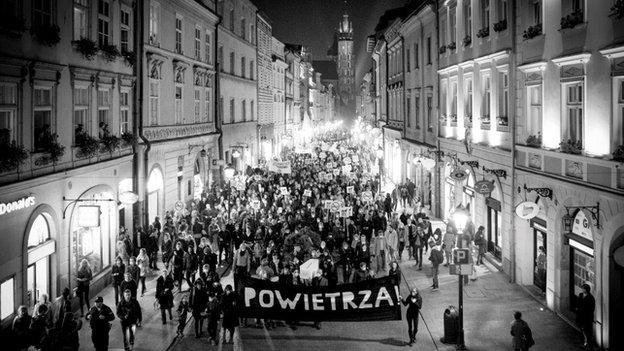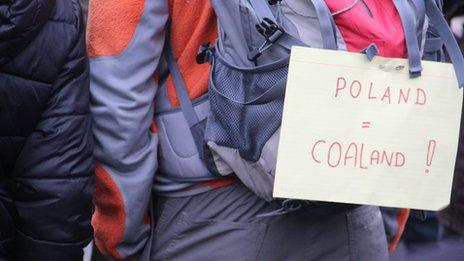Poland: Can country shake off 'coal land' label?
- Published

Protests in the city of Krakow have highlighted the poor air quality caused by burning coal
A coal summit has opened in Warsaw, down the road from UN climate talks. Poland stands accused of thumbing its nose at efforts to cut emissions by encouraging use of the most carbon-intense fuel. The BBC's Matt McGrath examined whether the government's goal of a cleaner future for coal was anything more than a pipe dream.
In the dense, foggy haze that sits over the ancient city of Krakow, you can barely see the outline of Wavel's famous castle.
Legend has it that a fire breathing dragon lives in the bowels of this fortress, but the mythical beast is not responsible for the smog that now clogs the city. It's the 35,000 households in the central area that use coal for heating.
"This is the situation we face during the entire winter season," said Andrzej Gula, a campaigner for cleaner air in the city as we look down on the grey blanket enveloping his town.
"It's why Krakow is one of the most heavily polluted cities in all of Europe."
The statistics are very worrying, he says. The air is so dirty that every man, woman and child breathes in the equivalent of 2,500 cigarettes every year.
Krakovians are angry about the issue. There have been several demonstrations in the streets calling for action.
"People in Krakow actually hate coal. They know it is the major source of the problem, they are demanding that politicians do something about this," said Mr Gula.
But politicians are reluctant to move forward with a ban.
"The problem is that to change the law you have to go to the regional authority," says journalist Tomasz Ulanowski, who lives in Krakow.
"Those politicians don't live in the city, and they are elected by people who live in mining communities.
"No sane politician would forget about those votes."
The national government is also reluctant to tamper with the role of coal. Poles see it as a national resource, something that could last for 600 years at current rates of extraction. And they are at loggerheads with the European Union over its future.
Poland produces more than 85% of its electricity using coal and says its economy depends on continuing to use it.
As well as economic arguments, Poland is wary of its large neighbour Russia, from which it imports crucial gas supplies. The future security of these imports makes the Poles nervous about moving away from coal.
Last year, the Polish government vetoed EU proposals, external that would have reduced carbon emissions significantly from 2020 onwards.
Prof Krzysztof Stanczyk, from the Central Mining Institute in Katowice, shows off the reactors that have been built at the institute to simulate what he says are cleaner ways of burning coal
Poland argues that coal is not just critical for its future energy needs, it is a substance the developing world is going to use in greater quantities to satisfy the global hunger for energy.
And it can point to projections from the International Energy Agency (IEA) that supports this view. The IEA says that by 2035 coal will still be the dominant source, external of electricity production throughout the world.
So Poland and others argue that cleaning up coal is the only policy that makes sense.
To that end, and with support from the EU, they've just opened a 45 million-euro clean coal research centre to develop the technologies that will take the carbon dioxide from the black stuff.
In the bustle of the technology hall where several different types of clean coal technologies are being installed, the centre's co-ordinator, Prof Krzysztof Stańczyk, tells me that clean coal is now "the most important topic in energy".
Shale gas was once touted as transforming the future for Poland. But the geology is difficult, and the foreign investors have packed up and left. Coal is the only game in town.
Standing in front of what looks like a space age iron lung, Prof Stańczyk tells me that this reactor is the only one of its type in the world.
It will allow the scientists here to essentially reverse engineer hard coal. The machine will bake it under enormous pressure and at extremely high temperatures and turn it into a gas from which carbon dioxide can be extracted and stored, leaving a clean fuel that can be burned.
"I think it will be a reality in 10 years," said Prof Stańczyk.
"In the EU Commission there is a paradigm change that economy is more important than ecology.
"There can be many different clean coal technologies, but all of them must be safe and environmentally friendly, so if they fulfil these criteria we can make clean coal a reality."

Demonstrators say that coal can never be a clean source of energy
As well as research, Poland is moving ahead with other clean coal projects. An Australian company called Linc Energy says they will open a demonstration plant in 2014 to show the potential for underground coal gasification.
This approach literally burns the coal deep in the ground to produce synthesis gas that can be used for electricity production.
"We get this right and the government signs off on going commercial, we could be making between 10-25% of Poland's gas needs within 3 years", said Peter Bond, Linc Energy's chief executive on a recent visit to Krakow.
The process means very little disturbance on the surface, and coal can be turned into gas 1,000m underground.
Peter Bond firmly believes that coal can continue to be utilised in a cleaner way in order to meet climate goals.
"At the moment, the argument is black and white, you're either for or anti coal - there is no middle ground, but there is middle ground, and UCG is it," he says.
Back in Warsaw, environmental campaigners opposed to the continued use of high carbon fossil fuels marched over the weekend to chants of "keep the coal in the hole".
One protestor told me he didn't believe clean coal would ever be a reality.
"It's dirty," he said.
"Coal just causes suffering everywhere."
Follow Matt on Twitter, external
- Published18 November 2013
- Published17 November 2013
- Published13 November 2013